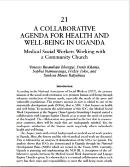| dc.contributor.author | Venesio, Bwambale Bhangyi | |
| dc.contributor.author | Denis, Kilama | |
| dc.contributor.author | Sophia, Namuwanga | |
| dc.contributor.author | Friday, Toko | |
| dc.contributor.author | Senkosi, Moses Balyejjusa | |
| dc.date.accessioned | 2024-01-12T08:50:18Z | |
| dc.date.available | 2024-01-12T08:50:18Z | |
| dc.date.issued | 2023 | |
| dc.identifier.citation | Androff, D., & Damanik, J. (Eds.). (2023). The Routledge International Handbook of Social Development, Social Work, and the Sustainable Development Goals. Taylor & Francis. | en_US |
| dc.identifier.uri | DOI: 10.4324/9781003177265-26 | |
| dc.identifier.uri | https://hdl.handle.net/20.500.12504/1545 | |
| dc.description.abstract | According to the National Association of Social Workers (2017), the primary
mission of the social work profession is to promote human well-being through
adequate satisfaction of human needs, especially the needs of the poor and
vulnerable populations. This primary mission in part is related to one of the
sustainable development goals (SDGs), that is, SDG 3 that focuses on health
and well-being. To promote the achievement of this SDG, the Medical Social
Work Department at the Naguru China-Uganda Friendship Hospital started a
collaboration with Lugogo Baptist Church so as to meet the needs of patients
at this hospital. The collaboration was grounded in the fact that in resource-
poor countries, there will be needs that are inadequately satisfied. Yet, the
inadequate satisfaction of the human needs negatively affects individual’s
health and well-being.
The chapter starts with a brief background on medical social work practice
in Uganda. Here, the history and the role of medical social work are discussed.
This is followed by an analysis of domestication of the SDGs in Uganda. The
analysis shows that SDGs are domesticated in Uganda through the National
Development Plans (NDPs) which are rooted in the Vision 2040. Currently,
Uganda is pursuing and implementing the NDP III. A description of the col-
laborative agenda between the Medical Social Work department and Lugogo
Baptist Church is given. It is shown that it is a mutual collaboration where each
party has their roles and responsibilities to meet the well-being needs clearly spelt out. A human needs framework is described where the meaning of human
needs and specific examples are given. The human needs that are met through
this framework are analyzed. This is followed by the discussion of the achieved
health and well-being and the shared roles of the collaborative framework. It is
concluded that because of the benefits from this collaboration, medical social
workers should engage in collaborations with local and community actors to
improve social work interventions since these have critical resources that are
plenty, accessible and trusted. | en_US |
| dc.language.iso | en | en_US |
| dc.publisher | Taylor & Francis Group | en_US |
| dc.subject | Human well-being | en_US |
| dc.subject | Health | en_US |
| dc.subject | Medical social work practice | en_US |
| dc.subject | Sustainable Development Goals (SDGs) | en_US |
| dc.title | A collaborative agenda for health and well-being in Uganda : Medical social workers working with a community church | en_US |
| dc.type | Book chapter | en_US |

